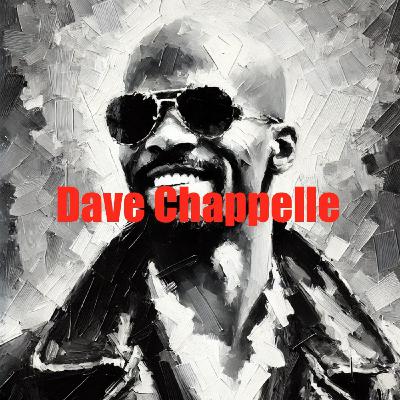Dave Chappelle's Saudi Arabia Controversy: Comedian or Hypocrite?
Update: 2025-10-05
Description
Dave Chappelle BioSnap a weekly updated Biography.
Dave Chappelle is once again the center of a national controversy, and this time the headlines are not from his own backyard. On September 27, Chappelle took the stage at the highly publicized Riyadh Comedy Festival in Saudi Arabia alongside other A-list comedians such as Kevin Hart and Chris Tucker, a move itself widely seen as contentious given Saudi Arabia’s track record on human rights. During his set, Chappelle made headlines by declaring “it’s easier to be a comedian in Saudi Arabia than in America,” pointing to what he framed as America’s cancel culture and making reference to the uproar that followed the death of conservative figure Charlie Kirk and the brief suspension of Jimmy Kimmel for mocking Republican responses to that event. According to reports in The New York Times and amplified by The Grio and AOL, he said, “Right now in America, they say that if you talk about Charlie Kirk, that you’ll get canceled. I don’t know if that’s true, but I’m gonna find out.” He added, “It’s easier to talk here than it is in America.”
Those comments immediately sparked intense backlash back in the United States. Critics, including commentators for The Nation and The AV Club, called out the bitter irony in Chappelle’s remarks. Saudi Arabia, after all, is a kingdom where criticism of the royal family or Islam can lead to prison—and where the very comedy festival he was attending gave explicit speech restrictions to performers, with documented cases of young Saudis jailed for their tweets. Chappelle’s detractors saw his statement as tone-deaf at best, willfully blind at worst, pointing out that he’s faced little real censorship at home despite his controversial and sometimes incendiary jokes about trans people and other marginalized groups. His Netflix specials remain platform hits, and he continues to ink multimillion-dollar deals and sell out arenas.
Business-wise, his appearance is seen as part of Saudi Arabia’s Vision 2030 initiative, a massive, well-funded attempt to recast the nation’s ultra-conservative image and attract A-list Western celebrities for legitimacy, known in activist circles as “comedianwashing.” More than a few high-profile comedians—Tim Dillon, for example—declined the invitation on principle, but Chappelle was among those who made the trip, reportedly for a significant payday. Social media exploded with both mockery and criticism; one viral post on Threads labeled him “the new Russell Brand—a formerly edgy comedian who turned out to be a complete fraud.”
There have been no public statements yet from Chappelle addressing the uproar, nor any indication of walkbacks or clarifications. If recent history holds, he may well incorporate the controversy into future material, but as of this weekend, his appearance in Saudi Arabia—and his comments on censorship—are dominating his biographical narrative, raising fresh questions about his legacy, his principles, and who really gets to define “free speech” on the world stage.
Get the best deals https://amzn.to/3ODvOta
This content was created in partnership and with the help of Artificial Intelligence AI
Dave Chappelle is once again the center of a national controversy, and this time the headlines are not from his own backyard. On September 27, Chappelle took the stage at the highly publicized Riyadh Comedy Festival in Saudi Arabia alongside other A-list comedians such as Kevin Hart and Chris Tucker, a move itself widely seen as contentious given Saudi Arabia’s track record on human rights. During his set, Chappelle made headlines by declaring “it’s easier to be a comedian in Saudi Arabia than in America,” pointing to what he framed as America’s cancel culture and making reference to the uproar that followed the death of conservative figure Charlie Kirk and the brief suspension of Jimmy Kimmel for mocking Republican responses to that event. According to reports in The New York Times and amplified by The Grio and AOL, he said, “Right now in America, they say that if you talk about Charlie Kirk, that you’ll get canceled. I don’t know if that’s true, but I’m gonna find out.” He added, “It’s easier to talk here than it is in America.”
Those comments immediately sparked intense backlash back in the United States. Critics, including commentators for The Nation and The AV Club, called out the bitter irony in Chappelle’s remarks. Saudi Arabia, after all, is a kingdom where criticism of the royal family or Islam can lead to prison—and where the very comedy festival he was attending gave explicit speech restrictions to performers, with documented cases of young Saudis jailed for their tweets. Chappelle’s detractors saw his statement as tone-deaf at best, willfully blind at worst, pointing out that he’s faced little real censorship at home despite his controversial and sometimes incendiary jokes about trans people and other marginalized groups. His Netflix specials remain platform hits, and he continues to ink multimillion-dollar deals and sell out arenas.
Business-wise, his appearance is seen as part of Saudi Arabia’s Vision 2030 initiative, a massive, well-funded attempt to recast the nation’s ultra-conservative image and attract A-list Western celebrities for legitimacy, known in activist circles as “comedianwashing.” More than a few high-profile comedians—Tim Dillon, for example—declined the invitation on principle, but Chappelle was among those who made the trip, reportedly for a significant payday. Social media exploded with both mockery and criticism; one viral post on Threads labeled him “the new Russell Brand—a formerly edgy comedian who turned out to be a complete fraud.”
There have been no public statements yet from Chappelle addressing the uproar, nor any indication of walkbacks or clarifications. If recent history holds, he may well incorporate the controversy into future material, but as of this weekend, his appearance in Saudi Arabia—and his comments on censorship—are dominating his biographical narrative, raising fresh questions about his legacy, his principles, and who really gets to define “free speech” on the world stage.
Get the best deals https://amzn.to/3ODvOta
This content was created in partnership and with the help of Artificial Intelligence AI
Comments
In Channel





